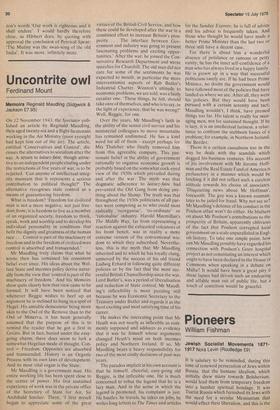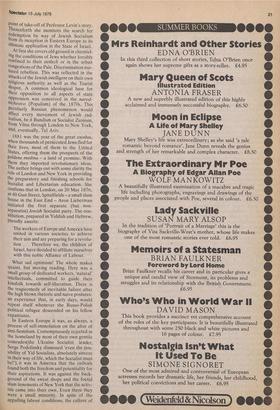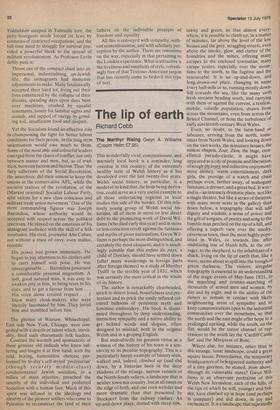Pioneers
William Fishman
Jewish Socialist Movements 1871 1917 Nora Levin (Routledge £9)
It is salutary to be reminded, during this time of renewed persecution of Jews within Russia, that the humane idealism, which initially drew many towards Bolshevism, would lead them from temporary freedom into a harsher spiritual bondage. It was Tsarist Russia which furnished its Jews with the need for a secular Messianism that would effect their liberation, and this is the
Point of take-off of Professor Levin's story. Thenceforth she monitors the search for redemption by way of Jewish Socialism from its inception in Eastern Europe to its Ultimate application in the State of Israel.
At first she covers old ground in chronicling the conditions of Jews whether forcibly confined to their stetlech or in the urban congestions of the Pale. Discrimination nurtured rebellion. This was reflected in the attacks of the Jewish intelligent on their own religious authority as well as the Tsarist despot. A common ideological base for their opposition to all aspects of state oppression was conceived in the narodnichestvo (Populism) of the 1870s. This Peculiarly Russian phenomenon would affect every movement of Jewish radicalism, be it Bundism or Socialist Zionism, from Vilna through London to New York, and, eventually, Tel Aviv.
1881 was the year of the great exodus, When thousands of persecuted Jews fled for their lives, most of them to the United .States, offering them the prospects of the golden e medina — a land of promise. With them they imported revolutionary ideas. The author brings out with some clarity the role of London and New York in providing the preparatory and finishing schools for Socialist and Libertarian education. She Confirms that in London, on 20 May 1876, at 40 Gun Street, Spitalfields — a small slum house in the East End — Aron Lieberman initiated the first separate (but nonseparatist) Jewish Socialist party. The constitution, prepared in Yiddish and Hebrew, Proudly asserts:
The workers of Europe and America have united in various societies to achieve their aim and are preparing for a revolution . . . Therefore we, the children of Israel, have decided to affiliate ourselves with this noble Alliance of Labour.
What sad optimism! The whole makes quaint, but moving reading. Here was a small group of dedicated workers, 'natural' intellectuals, committed to guide their kinsfolk towards self-liberation. There is the tragicomedy of inevitable failure after the high blown rhetoric and naive postures: an experience that, in early days, would repeat itself whenever the Russo-Polish Political refugee descended on his fellow expatriates.
In Eastern Europe it was, as always, a process of self-immolation on the altar of anti-Semitism. Contemptuously rejected in the homeland by most of their own gentile eomrades(the Ukraine Socialist leader, Serge Podolinsky dismissed 'even the possibility of Yid Socialists, absolutely sincere in their way of life, which the Socialist must be!'), it was in America that the radicals found both the freedom and potentiality for their aspirations. It was against the background of the sweat shops and the foetid slum tenements of New York that the activists came into their own. Even there they were a small minority. In spite of the appalling labour conditions, the culture of Yiddishkeit steeped in Talmudic lore, the petty-bourgeois mode forced on Jews by centuries of restricted occupations, and the full-time need to struggle for survival provided a powerful block to the spread of militant revolutionism. As Professor Levin deftly puts it: Thrust out of the compact shted into an impersonal, industrialising, un-Jewish life, the immigrants had immense adjustments to make. Many fatalistically accepted their hard lot, living out their lives embittered by the collapse of their dreams, spending days upon days bent over machines, crushed by squalid tenements, lonely for familiar sights and sounds, and sapped of energy by grinding toil, insufficient food and despair.
Yet the Socialists found an effective role in championing the fight for better labour conditions for their people. In the long term unionisation would owe much to them. Some of the most able and colourful leaders emerged from the chaos of conflict, not only between master and men, but, as of tradition, between faction and faction. Thus 'the fiery adherents of the Social Revolution, the anarchists, did their utmost to keep the unions in the conservative AFL, while the socialist traitors of the revolution, of the (Marxist oriented) Socialist Labour Party, split unions for a new class conscious and militant trade union movement.' One of the more commanding figures was Joseph Barondess, whose authority would be accepted with respect across the political spectrum. He played on the emotions of his immigrant audience with the skill of a folk troubador. His rival, journalist Abe Cahan, not without a trace of envy, even malice, records: His power had grown immensely. He began to pay attention to his clothes and to carry himself with poise. He was unrecognisable. . . Barondess possessed a considerable personal magnetism. A soft, good natured man, it was easy to awaken pity in him, to bring tears to his eyes, and to get a favour from him . . . His voice alone created respect . . . knew many cloak-makers who were literally fascinated by him. They loved him and trembled before him.
The ghettos of Warsaw, Whitechapel, East side New York, Chicago, were congested with a dearth of talent which, inevitably, bred such charismatic folk leaders.
Contrast the warmth and spontaneity of these genuine old radicals who knew suffering and fought it at first hand, with the cold, boring, humourless rhetoric performed by to-day's self-styled 'proletarian' (though securely middle-class) revolutionaries! Jewish socialists, in a milieu of mass injustice, preached the sanctity of the individual and proferred Socialism with a human face. Much of this spirit was infused in the ideology and identity of the pioneer settlers who came to Palestine to reconstruct the land of their fathers on the indivisible precepts of freedom and equality.
All this is conveyed with sympathy, without sententiousness, and with scholarly perception by the author. There are omissions on the way, especially in that pertaining to the London experience. What is attractive is the liveliness and simplicity of style, refreshingly free of that Teutono-American jargon that has recently come to bedevil this type of text.




































 Previous page
Previous page